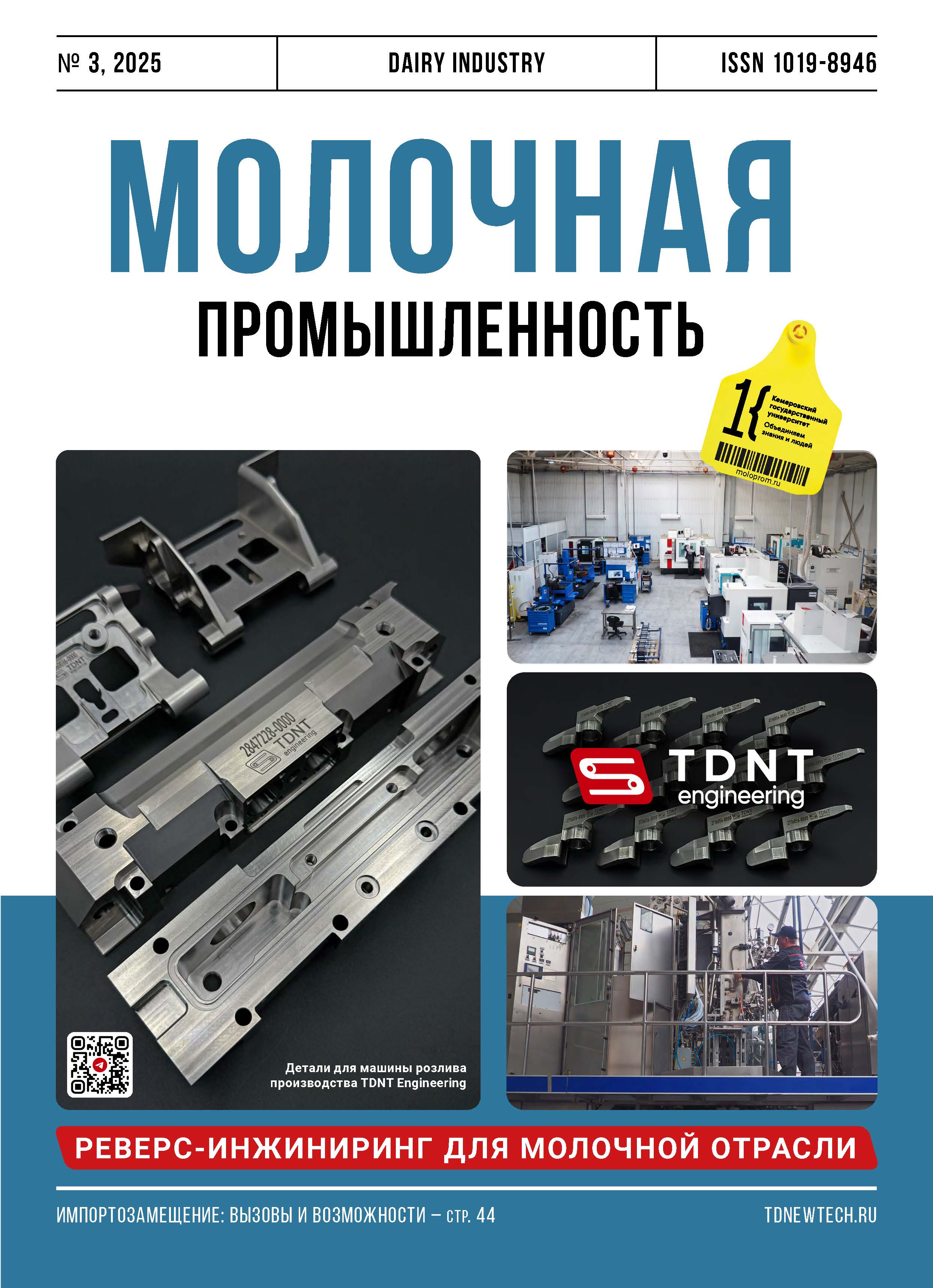Moscow, Russian Federation
Moscow, Moscow, Russian Federation
This review covers regulatory documents on dairy raw materials used in enteral nutrition. The macronutrient composition of basic enteral nutrition products includes 3.75–6.25% protein, 2.78–4.44% fat, and 11.25–16.25% carbohydrates. Despite the high biological value of dairy raw materials, none of its constituents alone can provide enough energy to satisfy the recommended daily intake for all nutrients. Dairy composition must be adapted to the formula of each specific enteral nutrition product because the content of nutritional and biologically active substances must correspond to physiological needs. For instance, the share of protein is to be based not on the total solids, but on the mass fraction of protein in concentrated milk and whey proteins and food caseinates. Food caseinate may be used to limit the milk sugar content in finished enteral nutrition products and correct its protein content. Enteral nutrition powders require special equipment for condensing and drying. Liquid enteral nutrition products are similar enough to compound dairy products to produce them at a city dairy plant equipped with aseptic filling devices to ensure the standard industrial sterility for Grade A canned baby and dietary foods.
enteral nutrition, classification of enteral nutrition products, dairy raw materials, macronutrient composition, whey protein concentrate, food caseinate, milk protein concentrate
1. Arends, J. ESPEN guidelines on nutrition in cancer patients / J. Arends [et al.]. Clinical Nutrition. 2017. Vol. 36(1). P. 11–48. https://doi.org/10.1016/j.clnu.2016.07.015
2. Barazzoni, R. ESPEN expert statements and practical guidance for nutritional management of individuals with SARS-CoV-2 infection / R. Barazzoni [et al.] // Clinical Nutrition. 2020. Vol. 39(6). P. 1631–1638. https://doi.org/10.1016/j.clnu.2020.03.022
3. Puthucheary, Z. A. Predicting critical illness mortality and personalizing therapy: Moving to multi-dimensional data / Z. A. Puthucheary, P. Wischmeyer // Critical Care. 2017. Vol. 21(1). P. 1–2. https://doi.org/10.1186/s13054-016-1597-6
4. Stratton, R. J. A systematic review and meta-analysis of the impact of oral nutritional supplements on hospital readmissions / R. J. Stratton, X. Hébuterne, M. Elia // Ageing Research Reviews. 2013. Vol. 12(4). P. 884–897. https://doi.org/10.1016/j.arr.2013.07.002
5. Luft, V. M. Organizacionnye aspekty nutricionnoy podderzhki bol'nyh v mnogoprofil'nom stacionare skoroy pomoschi / V. M. Luft, A. V. Lapickiy, A. M. Sergeeva // Vestnik anesteziologii i reanimatologii. 2024. T. 21, № 1. S. 88–94. https://doi.org/10.24884/2078-5658-2024-21-1-88-94; https://elibrary.ru/grmvil
6. Potapov, A. L. Dopolnitel'noe peroral'noe pitanie v sostave nutritivnoy podderzhki v onkohirurgii / A. L. Potapov // Vestnik anesteziologii i reanimatologii. 2020. T. 17, № 2. S. 64–69. https://doi.org/10.21292/2078-5658-2020-17-2-64-69; https://elibrary.ru/pzkmxq
7. Deutz, N. E. Readmission and mortality in malnourished, older, hospitalized adults treated with a specialized oral nutritional supplement: A randomized clinical trial / N. E. Deutz [et al.] // Clinical Nutrition. 2016. Vol. 35(1). P. 18–26. https://doi.org/10.1016/j.clnu.2015.12.010
8. Gunnarsson, A. K. Patients with hip fracture. Various aspects of patient safety / A. K. Gunnarsson. – Acta Universitatis Upsaliensis Uppsala, 2014. – 70 p.
9. Hoekstra, J. C. Effectiveness of multidisciplinary nutritional care on nutritional intake, nutritional status and quality of life in patients with hip fractures: A controlled prospective cohort study. Clinical Nutrition. 2011. Vol. 30(4). P. 455–461. https://doi.org/10.1016/j.clnu.2011.01.011
10. Anbar, R. Tight calorie control in geriatric patients following hip fracture decreases complications: a randomized, controlled study / R. Anbar [et al.] // Clinical Nutrition. 2014. Vol. 33(1). P. 23–28.
11. Shestopalov, A. E. Siping kak vid nutritivno-metabolicheskoy podderzhki v klinicheskoy medicine / A. E. Shestopalov, A. V. Dmitriev // Sovremennaya onkologiya. 2019. T. 21, № 4. S. 35–44. https://doi.org/10.26442/18151434.2019.4.190702; https://elibrary.ru/oiymdz
12. Norman, K. Cost-effectiveness of a 3-month intervention with oral nutritional supplements in disease-related malnutrition: A randomised controlled pilot study / K. Norman [et al.] // European Journal of Clinical Nutrition. 2011. Vol. 65(6). P. 735–742. https://doi.org/10.1038/ejcn.2011.31
13. Elia, M. A systematic review of the cost and cost effectiveness of using standard oral nutritional supplements in the hospital setting / M. A. Elia [et al.] // Clinical Nutrition. 2016. Vol. 35(2). P. 370–380. https://doi.org/10.1016/j.clnu.2015.05.010
14. Bear, D. E. The role of nutritional support in the physical and functional recovery of critically ill patients: a narrative review / D. E. Bear [et al.] // Critical Care. 2017. Vol. 21(1). P. 1–10. https://doi.org/10.1186/s13054-017-1810-2
15. Van Zanten, A. R. H. Nutrition therapy and critical illness: practical guidance for the ICU, post-ICU, and long-term convalescence phases / A. R. H. Van Zanten, E. De Waele, P. E. Wischmeyer // Critical Care. 2019. Vol. 23(1). P. 1–10. https://doi.org/10.1186/s13054-019-2657-5
16. Gapparova, K. M. Opyt sozdaniya i vnedreniya v promyshlennoe proizvodstvo specializirovannogo pischevogo kislomolochnogo produkta "Kovitalakt" / K. M. Gapparova // Erismanovskie chteniya - 2024. Novoe v nutriciologii i gigiene pitaniya dlya obespecheniya sanitarno-epidemiologicheskogo blagopoluchiya naseleniya: Materialy II Vserossiyskogo nauchnogo kongressa s mezhdunarodnym uchastie. Mytischi: Federal'nyy nauchnyy centr gigieny im. F. F. Erismana, 2024. S. 28–30. https://elibrary.ru/lbiczk
17. Sharafetdinov, H. H. Ocenka klinicheskoy effektivnosti specializirovannogo kislomolochnogo produkta dlya dieticheskoy korrekcii narusheniy uglevodnogo i zhirovogo obmena / H. H. Sharafetdinov [i dr.] // Voprosy pitaniya. 2024. T. 93, № 6(556). S. 67–75. https://doi.org/10.33029/0042-8833-2024-93-6-67-75; https://elibrary.ru/rtxvoi
18. Weimann, A. ESPEN guideline: Clinical nutrition in surgery / A. Weimann // Clinical Nutrition. 2017. Vol.36(3). P. 623–650. https://doi.org/10.1016/j.clnu.2017.02.013







